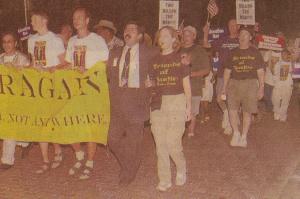
I have probably never been as scared as I was when three hundred people marched from a park in Tulia, Texas to the courthouse at the heart of town. Forty-seven men and women had been arrested a couple of years earlier. To the day. The New York Times and ABC’s 20/20 had given the story some attention a years yearlier, but by the summer of 2001 the cameras were long gone. The only people willing to stand with us were the families directly impacted by the operation (including 50 “drug war orphans” who had lost one or both parents to a notoriously corrupt drug operation) and a band of people, mostly from Austin, who were opposed to the War on Drugs. Most of the issues we were fighting for then are mainstream now, but in 2001 the drug war was still a hot ticket.
This narrative has been excerpted from my book, “Taking out the Trash in Tulia, Texas“. Thanks to the November Coalition for most of the photographs. I wish I had more, but, as you will learn below, I was kinda busy. I share these memories to remind the world that the protests roiling the nation in the summer of 2020 have a long and painful history. But those of us who lived in Tulia weren’t the only people who were afraid. Looking back, I realize that law enforcement was even more frightened than we were. It would take another two years of struggle, but the Tulia drug bust was eventually overturned and, ever since, the war on drugs has been losing steam. Lot’s of money still flowing, to be sure, but the mojo is gone for good. “While tyrants tremble, sick with fear, and hear their death knells ringing,
When friends rejoice, both far and near, how can I keep from singing?”
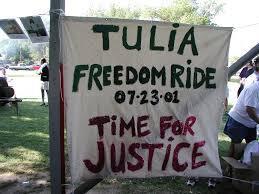 Two “Freedom Ride” buses arrived mid-afternoon and were directed to the Memorial Building where they could enjoy a meal in air-conditioned comfort. Tracey Hayes, the main organizer for the event, told me they had stopped by a state prison outside Plainview for an informal protest before driving the final twenty-five miles to Tulia.
Two “Freedom Ride” buses arrived mid-afternoon and were directed to the Memorial Building where they could enjoy a meal in air-conditioned comfort. Tracey Hayes, the main organizer for the event, told me they had stopped by a state prison outside Plainview for an informal protest before driving the final twenty-five miles to Tulia.
“We contacted the prison and let them know we were coming,” Tracey told me. “The warden must have taken it as a threat or something because they wouldn’t even let us in the gate.
In fact (and this is really crazy) we learned that all the prisons within a 100 mile radius of Tulia are on full lockdown all day long.”
As Tracey walked away I wondered what possible threat a little rally in isolated Tulia might pose to heavily fortified prisons in Plainview, Amarillo and Childress? Officer Doyle Ozment of the Tulia Police Department had dropped by a few hours earlier to inform me that police vehicles would be circling the park throughout the day. “It’s just a precaution to make sure things don’t get out of hand,” he told me softly. In addition, thirty-five Department of Public Safety officers in full riot gear had been stationed downtown “just in case.”
The culture of this town
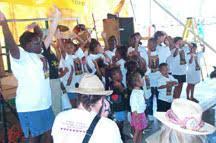 The rally began with two songs by the Friends of Justice children’s choir. With Nancy Bean exhorting them on with waving arms, wide eyes and an enormous smile the kids rocked the joint. Most of them had lost a family member to the Coleman sting, a fact not lost on the crowd.
The rally began with two songs by the Friends of Justice children’s choir. With Nancy Bean exhorting them on with waving arms, wide eyes and an enormous smile the kids rocked the joint. Most of them had lost a family member to the Coleman sting, a fact not lost on the crowd.
Children played on the playground equipment at the west end of the park and young people played basketball at a court standing within earshot of the stage. When the music got loud and rap rhythms floated across the grass the kids came running. My son Adam had set up his drum kit on the cotton trailer stage and provided bare bones accompaniment to a Hip-Hop artist who had joined the Freedom Ride. The young people listened intently to his performance, stuck around to hear the next speaker or two; then drifted back to their basketball.
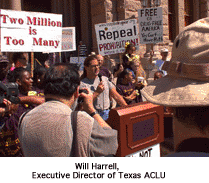 Jeff Frazier picked and sang Arlo Guthrie’s “City of New Orleans” then introduced Will Harrell. “The police who are circling and videotaping us right now need to know that we’re not going to leave Tulia, ever,” Harrell barked. “We are going to make an imprint on the culture of this town for evermore.”
Jeff Frazier picked and sang Arlo Guthrie’s “City of New Orleans” then introduced Will Harrell. “The police who are circling and videotaping us right now need to know that we’re not going to leave Tulia, ever,” Harrell barked. “We are going to make an imprint on the culture of this town for evermore.”
Then Harrell delivered the message that would be the ACLU’s Tulia mantra for the next three years: “The federal government does not care how you make the arrests or how you make the seizure. They simply want to see the numbers. So by the end of every year, each of the task forces that wishes to stay in business has to produce numbers—by any means necessary. We have to resist that—by any means necessary.”
Harrell and the ACLU had come to realize that what happened in Tulia was hardly exceptional. “All over the state, regional narcotics task forces are operating on funds from the federal government to do exactly what happened in Tulia: to target minority communities and those who don’t have the money to put on an adequate defense.”
Freddie Brookins appeared at the Never Again rally as President of the Tulia Chapter of the NAACP. The mythical Tulia chapter had no legal existence, but the NAACP name was magic and Freddie was determined to make the most of it. The audience was riveted.
Darlene Grant, a professor of social work at the University of Texas, entertained the crowd with a haunting rendition of “I want Jesus to Watch over Me”.
Tulia finds it’s voice
Charles Kiker was next up. “I’m mad about what the war on drugs has done to my native land,” he intoned gravely. “Some say Tulia has been given a black eye and ‘twas the Friends of Justice what done it. It wasn’t the Friends of Justice that gave my home town a black eye across the nation, ’twas the war on drugs what done it.”
When I couldn’t find anyone else to introduce, I read a letter from prison I had received from one of the Tulia inmates. “My heart goes out to Tom Coleman,” the letter said, “because it’s a spirit that’s living inside of him; and he’s headed for destruction. I pray that God delivers him from the enemy. The devil likes the kind of work that Tom Coleman is doing. But what Tom Coleman doesn’t realize is that the battle is not ours, but the Lord’s.”
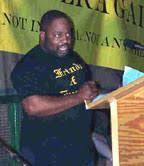 Rev. Edward Watters
Rev. Edward WattersNext, local pastor Edward Watters expounded one of the most subversive passages in the New Testament, the parable of the sheep and the goats. “It doesn’t matter where you go to church or how much you pray or even what you believe,” Watters said. “Jesus says, ‘I was hungry and ye gave me no meat; I was thirsty and ye gave me no drink; I was a stranger, and ye clothed me not; sick, and in prison, and ye visited me not.’”
Watters stood back from the pulpit we had borrowed from Jackson Chapel as he waited for these words to sink in. “Then everybody’s gonna have the same sorry line, ‘When did we ever see you in trouble or in prison and refuse to help you, Jesus? We’re always there for you.’ And Jesus is gonna have his answer ready: ‘Inasmuch as ye did it not to one of the least of these, ye did it not to me.’”
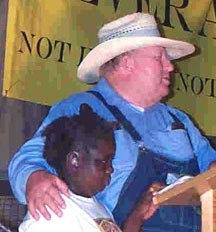 Gary Gardner
Gary GardnerAs the sun sunk low, Gary Gardner entertained the crowd with folksy banter and a few old gospel songs like “Sweet Hour of Prayer” on his harmonica. “My job is to get up there and look like a hick,” Gary told me. “These people see you and Charles and they’re gonna think they’re still in the big city. One look at me and they’ll know they ain’t in Kansas anymore.”
These endless skies
Religious messages, spoken, sung and danced, permeated the Never Again event. I had insisted that the rally climax with an unapologetically religious appeal. To that end, I invited Ken and Nancy Sehested to speak just in advance of our keynote speaker, Edwin Sanders.
Ken and Nancy Sehested were both born and raised in Southern Baptist churches in Texas. They had met in New York in the early 1970s when they both attended Union Theological Seminary, a bastion of liberal theology and progressive politics. The Sehesteds didn’t realize how far they had strayed from their religious and cultural roots until they attempted to peddle their spiritual wares south of the Mason Dixon line.
Ken Sehested presented a solid, factual, carefully argued indictment of the war on drugs, providing a theological underpinning for the arguments we had heard earlier in the day. Then Nancy Sehested shared a few wisps of spiritual autobiography.
Under these endless skies my Texas Baptist church taught me a story about God’s endless love and justice for all. Under these never-ending Texas skies, I learned of the never-ending love of Jesus, who spent his life doing justice to the outcast and oppressed, offering mercy to the humiliated, and walking in full allegiance to God and God alone. Many years ago I gave my heart to Jesus. I was captured by Christ’s vision of peace, and I’ve hardly had a peaceful moment since.
Then Nancy told us about a man “from a tiny, forgotten town like Tulia, in a desert country like West Texas. This man proclaimed good news to the poor and release to the prisoners. This man was searched and seized in the night by state authorities. He was arrested. He was held without due process. He was locked up as a common criminal. He was indicted on trumped-up charges on the strength of unsubstantiated and uncorroborated testimony. He was convicted without evidence. He was convicted without legal counsel. He was given the death penalty. He was killed by the state.”
I could see Charles Kiker clapping his hands soundlessly, rapture flickering in his eyes. I knew what he was feeling. The Never Again Rally wasn’t just about reviving a flagging fight; those of us who lived in Tulia were in desperate need of emotional and spiritual support.
God is on our side
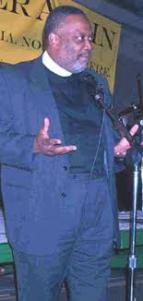 Rev. Edwin Sanders
Rev. Edwin SandersThe media had long since retreated to edit their reports and write their stories when Edwin Sanders was introduced. A tall man with the build of a football lineman, Sanders commands attention. The only survivor of the civil rights movement who has embraced drug policy reform as a central passion, Sanders has become a fixture in drug policy circles.
As the clock struck midnight and the actual anniversary of the Coleman raids was upon us, Sanders tied Tulia to the civil rights movement. “You might not have been in Selma Alabama,” he told us, his voice rising with the drumbeat cadence of his rhetoric. “You might not be able to say that you were in Birmingham or on the Pettis Bridge or in Anniston on the smoking bus with the freedom riders. But you can say, ‘I was in Tulia. I was there when something was ignited’. And I’m convinced that what happens here today is pivotal to ending the war on drugs.”
To hear Sanders tell it, a force had been unleashed in our midst. “The words, ‘Never Again,’ are not hollow words. These are prophetic words. They speak of a force that won’t settle for gradualism; a force that says right now. Not some day, but this day. Right now, this day, in Tulia, Texas. This day. Amen.”
As the crowd gave the big preacher from Nashville a standing ovation I stepped forward and embraced him, my arms barely reaching hardly half way around his massive frame.
Marching to the courthouse
Will Harrell and I climbed up on the cotton trailer stage and led the crowd through a couple of quick verses of We Shall Overcome.
“Have you got that Martin Luther King sermon hooked up?” Randy Credico asked me. He had handed me the tape the night before and I had rigged up a tape player next to the microphone. As the marchers moved out the words of Martin Luther King Jr. filled the park. “Five score years ago, a great American, in whose symbolic shadow we stand . . .”
 Volunteers were waiting with candles at the northwest corner of Conner Park and I told the crowd to move off in that direction. Brad Carter led the march followed by a big black and gold banner shouting, “Never Again! Not in Tulia, Not Anywhere”. Will Harrell took hold of the sign and called for volunteers. Randy was first in line followed by Adam and Lydia Bean, the flamboyant Lico Reyes of LULAC and Alphonso Vaughn of the Amarillo NAACP.
Volunteers were waiting with candles at the northwest corner of Conner Park and I told the crowd to move off in that direction. Brad Carter led the march followed by a big black and gold banner shouting, “Never Again! Not in Tulia, Not Anywhere”. Will Harrell took hold of the sign and called for volunteers. Randy was first in line followed by Adam and Lydia Bean, the flamboyant Lico Reyes of LULAC and Alphonso Vaughn of the Amarillo NAACP.
Beside the banner five members of the Rodriguez family marched proudly, little Dania holding a sign that read “educate, don’t incarcerate.” All but one member of the Rodriguez family were intellectually challenged but they had become an important part of our movement.
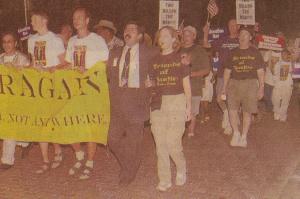 I took up the rear to ensure that the singing at the back of the procession was as strong as the singing at the front. But I marched briskly so I could be at the front of the marchers by the time we reached the courthouse.
I took up the rear to ensure that the singing at the back of the procession was as strong as the singing at the front. But I marched briskly so I could be at the front of the marchers by the time we reached the courthouse.
Helmeted officers stood at attention at each intersection we passed, their vehicles, lights flashing, serving as barricades. I smiled and waved at the officers as I passed and most of them returned the greeting. Some even removed their riot helmets in a gesture of respect.
I could see Thelma Johnson, Carolyn and Billy Wafer, Freddie and Patricia Brookins and their daughter-in-law, Theresa, marching bravely. Black teenagers were carrying a banner asking, “How many black people do we have to put in jail before we get white people to stop using drugs?”
As I caught up with Charles Kiker and Edwin Sanders, the chorus had just shifted from “we shall overcome,” to “we are not afraid.” “Actually,” Kiker whispered in Sanders’ ear, “I’m scared shitless.” I have often wondered if our visitors understood how much courage it took for Tulia residents to make this march.
My candle had blown out, but most of the marchers were still carrying flickers of flame. Passing Sydney Smith I stooped down and asked for a light. As I pulled even with Brad Carter at the head of the parade I could see Larry Stewart and his eleven deputies half a block away, standing defiantly in four lines, three abreast. Each deputy wore a white Stetson hat, a white shirt, a black tie, black jeans and black cowboy boots. Staring straight ahead, faces rigid, eyes smoldering, jaw muscles twitching, they seemed to be daring us to make an assault on the jailhouse. I glanced at Sheriff Stewart and Emit Benavidez, Stewart’s first in command. They looked as fearful as I felt.
I abandoned my plans to circle the courthouse. In such a volatile setting I needed to keep all participants in full view. Breaking off to my right I pointed to the courthouse steps and led the way, hundreds of singing marchers falling in behind.
Rev. Sanders joined me on the courthouse steps along with Darlene Grant and my daughter Lydia. Will Harrell, Randy Credico, Alphonso Vaughn and Adam Bean occupied the step below us holding the Never Again Banner aloft. I nodded to Darlene and her lovely alto quickly quieted the crowd.
“Amazing Grace, how sweet the sound, that saved a wretch like me. I once was lost but now am found; was blind, but now I see.”
I was sure Larry Stewart could hear Darlene singing and I wondered how the familiar words of the old gospel hymn were affecting him. “Amazing Grace” was the last thing he expected to hear from this motley rabble of druggies and aging hippies.
The singing stopped and it was time for me to say something. I could see Larry Stewart and his stalwarts in the distance, still standing motionless in the center of the cobblestone street, the eager young activists looking on with rapt attention, the black defendants and their families staring up at the courthouse where they had seen so much evil.
“It is right that we end the events of this day on the steps of the Swisher County Courthouse,” I told the crowd, “for it was here that the great injustice that brings us together was perpetrated. We have come to remember. We have come to grieve. We have come to say, “Never Again.”
The audience picked up the ragged chant, “Never Again!
Never Again!”
“But we have not come in anger,” I insisted. “We have not come with malice in our hearts or hateful words on our lips. We have come to speak the truth as we understand it. The prosecutor, the judge and the juries have all had their say, and now we have had ours. We do insist that our voices be heard—that every voice be heard.”
I nodded to my daughter Lydia and her strong soprano lifted the words of an old truth-soaked Quaker hymn up into the darkness.
While tyrants tremble, sick with fear, and hear their death knells ringing,
When friends rejoice, both far and near, how can I keep from singing?
In prison cell and dungeon vile our thoughts to them are winging.
When friends by shame are undefiled, how can I keep from singing?
Get out of town
Silently, reverently, we retraced our steps up Broadway to Conner Park. Most of the DPS officers were gone now—their presence obviously unnecessary. By the time I reached the park the freedom riders were already filling their buses.
I noticed a bus driver huddled with a few of the event organizers. “I was just lying there in the motel room catching a little television when I hear this knock on the door. I open up and there’s this cop standing outside. He asks me if I’m driving one of the buses from out of town and I say I am. Then he goes, ‘As soon as this thing is over you pack your people back onto those buses, get them out of town, and never come back again, ever.”
I moved down the aisles of both buses thanking everyone for coming. Many of the riders, especially the university students, seemed entranced. “I will never forget this day,” many of them told me. “After this, my life will never be the same.”
As the buses pulled out I made my way to the stage I could hear the words of Martin Luther King reverberating through the darkness. “I have a dream that every valley shall be exalted, every hill and mountain shall be made low, the rough places will be made plain, and the crooked places will be made straight, and the glory of the Lord shall be revealed, and all flesh shall see it together.”
